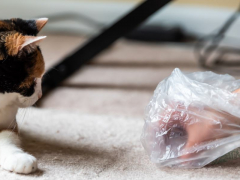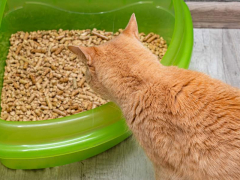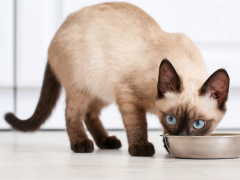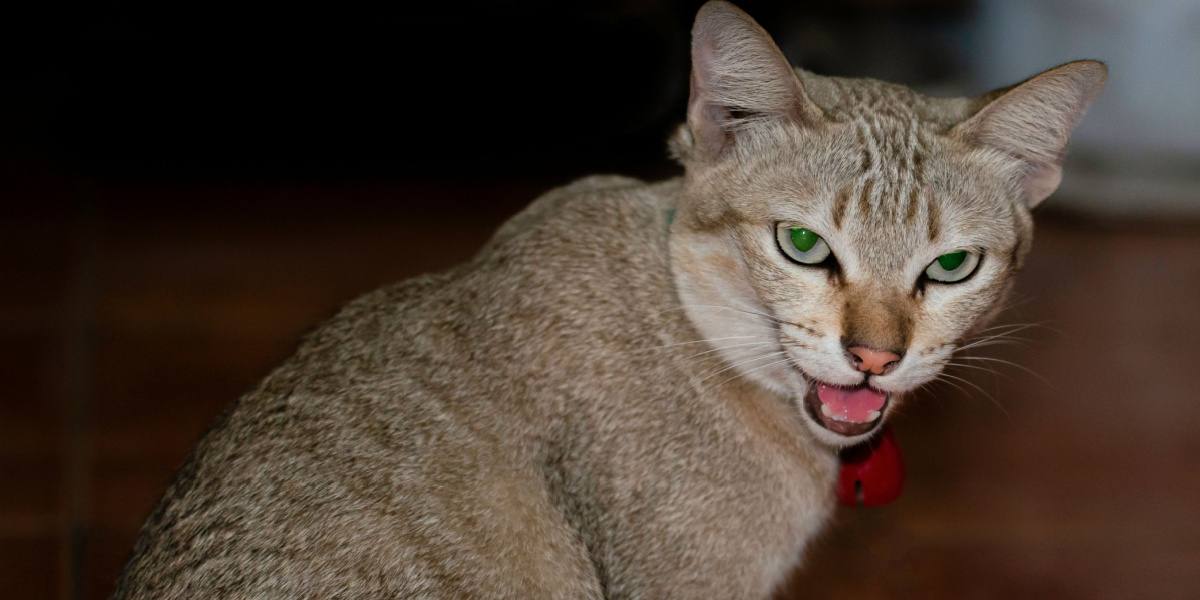
We want our cats to feel at ease and comfortable in their home, but sometimes they feel insecure. Insecure cat behavior is a sign that our cat isn’t feeling completely safe and may even be feeling stressed and anxious.
Insecure cat behavior is caused by many things and there are a few actions that we can take to help our cats in these situations. But first of all, we need to know how to recognize the signs of a cat that’s feeling insecure in their environment before we can help them.
Signs of Insecure Cat Behavior
Cats are sensitive souls and become stressed by the smallest thing. Some cats are more prone to stress than others and their early experiences and socialization influence this. Cats like routine and control so anything that interferes with their normal routine causes them great stress.
Cats are also naturally territorial animals that wouldn’t live with their species in the wild. Although pet cats can learn to live together peacefully, sometimes are issues between cats living in the same home. Inter-cat conflict is a big source of stress in households nowadays.
In short, anything that causes a cat to become stressed or anxious causes them to display signs of insecure behavior. This behavior signifies that something isn’t right in your cat’s world. Insecure cat behavior is a reaction to something. We’ll discuss the most common signs of insecure cat behavior below.
1. Not Using Their Litter Box
Cats that are stressed are less likely to use their litter box. They urinate or defecate outside of their litter box, which is also known as inappropriate elimination. This may be due to stress or issues with the litter box situation itself.
It may also be that they’re feeling threatened by another cat in the house and they’re not feeling comfortable enough to use the litter box.
2. Increased Scratching
Scratching is a normal cat behavior that allows cats to carry out nail maintenance, scent marking of their territory, and visually mark their territory with scratches. If a cat scratches more, it could be that they feel the need to mark their territory more, because they are feeling threatened or insecure. Marking the territory more makes them feel more secure in their home.
3. Increased Scent Marking
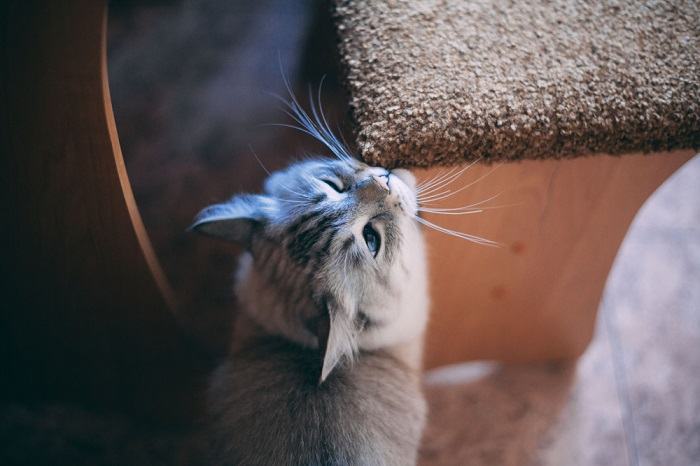
Cats secrete pheromones from glands in their skin, which they rub on items and people to mark their territory.
Similarly to scratching, cats that aren’t feeling secure in their environment might carry out behavior to make them feel more secure. Scent marking involves cats depositing pheromones from their cheeks and feet around their territory. It may also involve spraying (urine deposits) and feces (leaving their feces uncovered or toileting outside the litterbox).
Cats do this to leave their scent around their territory to deter other cats. If your cat is spraying or leaving feces around their house, they’re doing it because they’re feeling stressed and it’s up to you to find out why.
4. Excessive Vocalizations
Cats that are feeling stressed or insecure, may vocalize more. Vocalizations include meowing, hissing, and growling. Cats may even purr more as a self-soothing mechanism if they’re in pain or stressed.
5. Overgrooming
Anxious cats can overgroom so much that they pull out clumps of hair leaving them with hairless patches. This is most common on their tummy and back legs. It may have an underlying skin allergy component but stress is known to be a trigger of this overgrooming condition.
6. Change in Personality
Cats that are feeling stressed may act differently. They may go from being confident, interactive cats to withdrawn, irritable cats. It may cause them to become withdrawn, clingy, irritable, aggressive, or fearful. Any change in your cat’s personality is very important.
7. Change in Eating and Grooming Habits
Stress and insecurity can have a big impact on a normal day-to-day routine. Cats may spend less time or more time grooming, may eat less or more, drink less or more and their sleeping habits may change. Any change in your cat’s behavior is worth noting as it can mean that something is wrong with your cat.
8. Frequent Illness
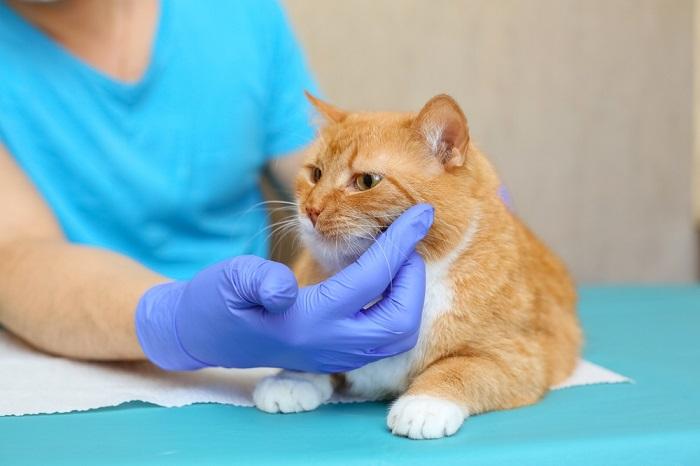
Just like humans, cats can fall ill more often when they have suffered from prolonged stress.
Cats that suffer from frequent illness or have medical issues that aren’t stabilizing, may be stressed. Stress can affect cats’ healing and their immune system negatively. Conditions such as cystitis as very common in stressed cats.
Causes of Insecure Cat Behavior
As we know by now, insecure cat behavior indicates to us that something isn’t OK in our cat’s world. Something is wrong and it’s our job to find out what it is so that we can try to help our cat. Anything that causes stress to our cats may cause this behavior. Potential causes of stress in cats include;
- Pain
- Change of routine (e.g. owner going back to work)
- New pet in the house
- New cat in the house
- New baby
- Change of furniture
- Building work
- A visitor staying in the house
This list is an example of things that may cause stress but it’s not an exhaustive list. Anything that interferes with a cat’s routine and household can cause stress. We’ll discuss how you can help your stressed cat now.
How To Help Cats That Are Insecure
There are many causes of insecure cat behavior and it’s important to try and find out what the problem is. Regardless of the cause, there are some actions that cat owners can take to help the situation and make their feline family members feel better.
Plugging in a synthetic pheromone diffuser can help in almost any stressful situation. The synthetic pheromones will help your cat feel more secure and relaxed in their home.
Provide plenty of resources for each cat that you have to reduce competition and fighting between cats. Resources include litter boxes, food and water bowls (separately), beds, scratching posts, and hiding areas. If cats need to compete for these resources, it may cause tension between cats.
And of course, provide plenty of positive human contact if your cat wants it and schedule playtime if this is something your cat usually enjoys.
If your cat’s behavior has suddenly changed or you think that something is wrong, you should book a visit with your veterinarian. Underlying illness and pain can cause stress to cats and cause them to act differently. It’s important to rule out medical issues as these aren’t something that you can treat at home. Your cat may need investigations and treatment. If health issues have been ruled out, they may need a referral to a feline behaviorist.
Final Thoughts
Cats are sensitive pets and can become stressed by any change in their routine or home. If they’re feeling insecure or stressed, there are some behavior changes that you may notice.
These can include increased vocalizations, increased scratching and marking, not using their litter box, and overgrooming. Plugging in a synthetic pheromone diffuser and providing plenty of resources can help with any stressful situation. A veterinary visit is recommended to rule out pain as an underlying cause of stress.
Also Read: Best Calming Aid For Cats
